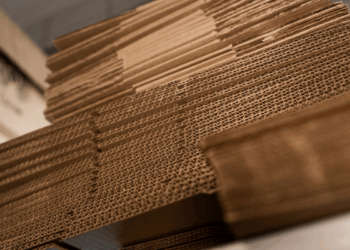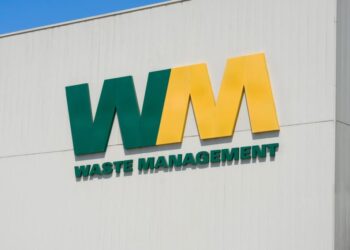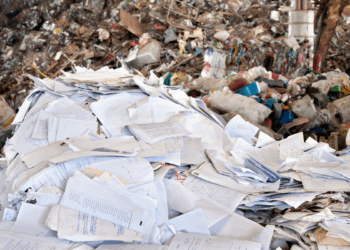Just five years after converting to use 100% recycled fiber in containerboard production, McKinley Paper Company will idle its mill in Port Angeles, Washington, in August. A company representative said West Coast OCC prices and depressed containerboard demand contributed to the closure.
McKinley on June 25 alerted the Washington State Employment Security Department that it would close the northern Washington mill and lay off 190 workers on Aug. 25. The news was first reported by the Peninsula Daily News.
McKinley, a subsidiary of Mexican packaging giant BioPappel, purchased the Port Angeles mill in 2017, when the facility was sitting idle as a former newsprint mill. It had been idled by previous owner Nippon that same year. McKinley, which already owned and operated a recycled paper mill in New Mexico and packaging plants elsewhere in the U.S., in 2018 announced it would reopen the Port Angeles facility as a 100% recycled containerboard plant.
The reopening announcement came amid a wave of U.S. mill conversion announcements in the wake of China’s restrictions on imports of recovered fiber. As material fell in price and was widely available, U.S. operators jumped at the chance to take advantage of low-cost domestic feedstock. At the same time, rising containerboard demand tied to the growing e-commerce market created healthy demand.
McKinley restarted the mill in 2020 with an initial projection of producing 250,000 short tons per year of containerboard from 100% recycled fiber, primarily OCC. The company spent at least $6.1 million to retool the plant, including adding a new pulper and two new paper machines, according to a profile of the plant compiled by Oak Ridge National Laboratory.
The recent closure announcement, then, is surprising not only to industry observers but to mill management as well.
“We were all pretty shocked last week when the corporation announced that based on economics, their plan was to idle the mill,” said Kevin Scott, general manager of the mill, during a July 1 meeting of the Clallam County Board of Commissioners, which is based in Port Angeles.
Manager cites OCC and packaging markets
Scott told the group the decision to close the mill, which came from BioPappel, was directly tied to recycled commodity markets.
“We compete in a worldwide commodity market,” he said, telling the group that OCC price has risen sharply over the past year. Especially on the West Coast, Scott said, “the price is higher than other parts of the country, driven by the export market to Asia. The Asian markets want the OCC, so they drive a higher price, and that raises our input costs.”
The national average price for OCC has risen from $49 per ton in July 2023 to $108 per ton this month, according to RecyclingMarkets.net.
Scott explained that the McKinley mill produces both medium, the wavy internal layer of containerboard, and liner, the outer layer that encases the medium. Additionally, it produces the raw kraft paper to make paper bags and makes specialized packaging products including “void fill,” which is used in e-commerce to protect products inside the box. McKinley counts e-commerce giant Amazon among its customers.
Despite shifting to supply the e-commerce market, the company has experienced sluggish demand, Scott explained.
“We were expecting that some of these market niches that we were starting to work in would help us economically,” he said. “But as the economy has been a little depressed in places, people are not buying as much, so the containerboard market is down, so prices for our product are down.”
He told the stakeholders, which included representatives of the Association of Western Pulp and Paper Workers – the union that represents workers at the facility – and local and state government officials, that the company planned to keep a skeleton crew working at the mill. That will allow McKinley to “keep the mill viable for a restart when the market conditions warrant it.”
John Fox, president of AWPPW Local 155 and a worker at the McKinley mill, called the mill’s closure a “catastrophic” event for the local community and questioned BioPappel’s reasons. He noted the union had just started negotiating a new contract “that would bring the employees up to an industrial standard, only to have the company decide that they were no longer interested in running the mill.”
“This doesn’t sound coincidental,” Fox added.
Besides the Port Angeles and Prewitt, New Mexico, paper mills, McKinley in 2022 purchased the Midwest Paper Group mill that was formerly Appleton Coated. That mill produces about 410,000 short tons per year of recycled containerboard, according to BioPappel’s website.
Across its entire company, BioPappel consumed 2.13 million short tons of recovered fiber in 2022, according to its most recent sustainability report. The company had a goal to hit 2.28 million short tons in 2023, the report added. The Port Angeles mill shutdown will likely lower the company’s overall recovered fiber consumption, unless it shifts capacity to other mills where OCC is cheaper.






























